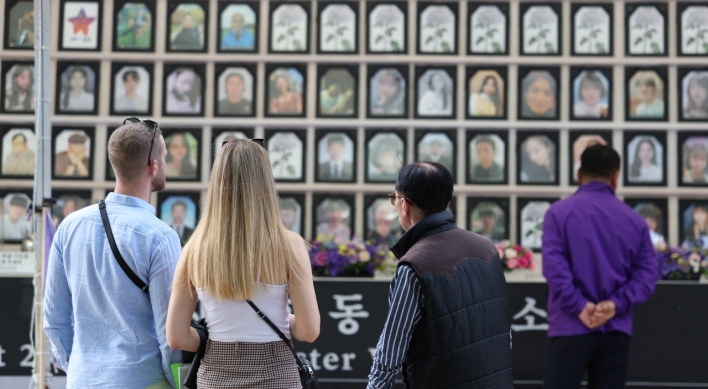Chung calls for closer ties with Korea’s second-largest trading bloc
Even though South Korea has seen its economy rapidly growing over the past several decades, its GDP accounts for only about 1.7 percent of the world’s GDP.
Should Korea meaningfully raise its voice and power in the international community, the GDP ratio of Korea could be at least 3 percent ― and an integrated Association of Southeast Asian Nations will play a pivotal role in helping Korea reach that goal, said Chung Hae-moon, secretary-general of ASEAN-Korea Centre.
The association is currently holding a summit in Cambodia to mainly discuss integrating the associations 600 million people and 10 member nations into an EU-like community by 2015.
“The year 2015 when the region becomes an economic bloc will come soon and boost exchanges of people, goods and services,” Chung said in an interview with The Korea Herald.
The former Korean ambassador to Thailand recently took office as head of the ASEAN-Korea Centre, established in March 2009 as an intergovernmental organization to promote economic and socio-cultural cooperation between ASEAN and Korea.
Even though South Korea has seen its economy rapidly growing over the past several decades, its GDP accounts for only about 1.7 percent of the world’s GDP.
Should Korea meaningfully raise its voice and power in the international community, the GDP ratio of Korea could be at least 3 percent ― and an integrated Association of Southeast Asian Nations will play a pivotal role in helping Korea reach that goal, said Chung Hae-moon, secretary-general of ASEAN-Korea Centre.
The association is currently holding a summit in Cambodia to mainly discuss integrating the associations 600 million people and 10 member nations into an EU-like community by 2015.
“The year 2015 when the region becomes an economic bloc will come soon and boost exchanges of people, goods and services,” Chung said in an interview with The Korea Herald.
The former Korean ambassador to Thailand recently took office as head of the ASEAN-Korea Centre, established in March 2009 as an intergovernmental organization to promote economic and socio-cultural cooperation between ASEAN and Korea.

“Business opportunities will expand and economies of scale will be achieved. Korea needs to boost its economic activities to double its share of global GDP, and ASEAN will play a significant role (in that),” he said.
South Korea’s nominal GDP surpassed $1 trillion in 2010, ASEAN’s GDP reached $1.8 trillion, according to World Economic Outlook Database released by the IMF. The region is the second-largest trading partner for Korea after China. The trade volume between Korea and ASEAN reached $125 billion last year and will hit the $150 billion mark soon, he said.
Chung said people-to-people contacts and exchanges between Korea and ASEAN will be the key to enhancing bilateral cooperation and exchanges.
While 3.5 million Koreans visited the ASEAN region, 1 million people from ASEAN visited Korea last year. Out of the 1 million, the largest portion came from Thailand with 310,000 visitors.
Under the work permit system where the Korean government sets job quotas for migrant workers, more than 150,000 workers from ASEAN are working in Korea.
He said an economic integration of ASEAN by 2015 would not result in a flood of migrant workers in Korea because the work permit system was not likely to change.
This year, the 60-year-old said he would exert his full effort to expand networks between Korean students and their counterparts in ASEAN, which will be “an investment for the future.”
He is working on plans to link Korean elementary, middle and high schools, and universities with those in ASEAN and encourage students to visit their counterparts.
The influx of people from ASEAN also helps Korea become an integrated society, he said.
“Before the cooperation with ASEAN, Korea was a monolithic society. But with the Southeast Asian people getting married, studying, working and doing business here, Korea is becoming a multicultural society,” he said.
During the ASEAN summit this week, leaders of the region may release a statement to raise concerns over North Korea’s planned rocket launch, news reports said Tuesday.
Geopolitical risks stemming from Pyongyang’s missile launches and nuclear programs will not affect exchanges between Korea and ASEAN, Chung said.
“I can say that it will be almost negligible. North Korean risks have always existed and ASEAN and Korea have managed those risks stably.”
ASEAN consists of Thailand, Vietnam, Myanmmar, Laos, Malaysia, Singapore, Cambodia, the Philippines, Brunei and Indonesia.
By Kim Yoon-mi (yoonmi@heraldcorp.com)
-
Articles by Korea Herald







![[Music in drama] Rekindle a love that slipped through your fingers](http://res.heraldm.com/phpwas/restmb_idxmake.php?idx=644&simg=/content/image/2024/05/01/20240501050484_0.jpg&u=20240501151646)


![[New faces of Assembly] Architect behind ‘audacious initiative’ believes in denuclearized North Korea](http://res.heraldm.com/phpwas/restmb_idxmake.php?idx=644&simg=/content/image/2024/05/01/20240501050627_0.jpg&u=20240502093000)








